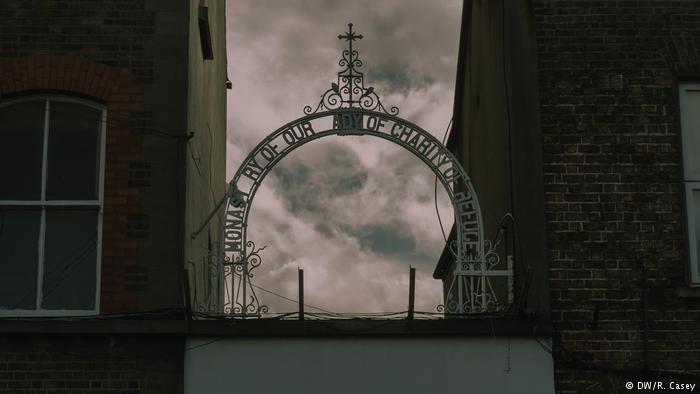|
Battle over Ireland's last Magdalene laundry
Deutsche Welle
Ireland's last Magdalene laundry is up for sale, but campaigners want a memorial to women who endured abuse at the hands of religious orders. Ruairi Casey reports from Dublin. A crowd of hundreds filled Dublin's Sean MacDermott Street in 1979 when Pope John Paul II passed by. Local residents were hopeful he would visit Our Lady of Lourdes Church, which holds the shrine of Matt Talbot, a leading figure in the Irish Church's temperance movement. The pope could hardly have failed to notice the dense mass of worshippers, but he did not stop. What he may not have seen was a long, brown-brick Victorian building on the opposite side of the street, one of Ireland's now notorious Magdalene laundries, where women were incarcerated and forced to work in slave-like conditions. Out of sight and mind for most of its history, it has now become a focal point in Ireland's coming to terms with its cruel and brutal treatment of women in the 20th century. The last operating laundry, only closing in 1996, Sean MacDermott Street is now in the hands of Dublin City Council, which plans to redevelop it for housing. But survivor groups and local politicians want to ensure a memorial is put in place to acknowledge the devastation suffered by women in Ireland's penal institutions. They are backed by a 2013 government report that established a redress scheme for victims, which also recommended the site house a memorial to "honor and commemorate" the women of the Magdalene laundries. Last week local councilors passed an emergency motion to block the sale of the site until survivors groups have been consulted and a suitable memorial constructed. They also called for an investigation into potential unmarked graves on the site following the grisly discovery of a mass grave of babies in a septic tank near a care home in Tuam earlier this month. In a statement in the wake of the vote, Dublin City Council said it was "in total agreement with the motion." No formal proposal has yet been made to redevelop the site, but survivors groups will be consulted in due course, it added. Regarding a memorial, the council said it is "very open to the suggestion of a suitable memorial and this will be a condition of any sale." But for Councilor Gary Gannon, who tabled the emergency motion, a condition of sale is simply not good enough. "It feels wrong at this point to be handing over the only laundry that's in possession of the state to private development," he told DW. "It's like we're going to bulldoze that building and forget anything ever happened." Gannon believes the building should be turned into an education center where the public can learn about the abuse of women in religious institutions across the country. "I think that building speaks a lot to who we are as a people and a lot to what we've done in our past," he said. "And I think if we've forgot that in 10, 20 or 30 years' time, it's a sad reflection of the society that we want to be." Beatings for petty mistakes Sean MacDermott Street was only one of a wide network of laundries run by four Catholic orders during the 19th and 20th centuries. Between 1922 - when Ireland became independent - and 1996, over 10,000 girls and women passed through their doors. Some were victims of abuse, some were committed by courts, and others were unwed mothers or considered troublesome at other institutions. In an interview with researchers in 2013, Lucy, a survivor of the Sean MacDermott Street laundry, told her story.* Sexually and physically abused for years by her father and older brothers, she was placed in the laundry by social services at the age of 14. Even as recently as 1979 nuns "ruled with an iron fist," she said. During her year there she worked 10-hour days, scrubbing living quarters and producing inventories of clothes as they arrived in the laundry, where mistakes resulted in routine beatings. "If you forgot to change [a number] or if you ... lost a sock or something, you'd be beaten to a pulp." The girls were kept behind barbed wire and locked doors, only allowed to leave once a week with nuns to buy toiletries. When guests were present, nuns were careful to keep the appearance of normality. "They were able to put on this persona that that they were happy ... but as soon as people went, it would be diverted back to being the baddies again." During her time in Sean MacDermott Street, Lucy attempted suicide by drinking two bottles of cough medicine, but eventually escaped when she spotted an unlocked door. Dehumanizing treatment as she describes was standard, with girls and women stripped of their identities as names were changed on entry. Rules of silence and devotion were enforced, and they were often made to make uniforms and have their hair cut. Irish state complicit Though owned and run by religious orders, the state too played an active role, said Maeve O'Rourke, legal adviser to Justice for Magdalenes Research. Magdalene laundries often won state tenders, able to undercut other businesses by using unpaid labor. Documents show the Sean MacDermott Street laundry had a contract with the Aras an Uachtarain, the official residence of the Irish president. "The state knowingly gave business to the Magdalene laundries knowing that the women were not being paid," said O'Rourke. In fact, an employment act passed in 1936 specifically exempted nuns from the obligation to pay workers. Taoiseach (Prime Minister) Enda Kenny gave a formal apology to victims in 2013, in which he lamented the hurt and stigma suffered by the Magdalene women. A redress scheme was established to which the state has paid tens of millions of euros, but to this day not one of the four orders who operated laundries has contributed to the compensation fund. Despite Kenny's apology, the state is still unwilling to acknowledge the full extent of its involvement, said O'Rourke, who pointed to more recent government statements downplaying its role and the existence of systemic abuse. "We now appear to have rolled back on the apology, and the state seems to think that maybe the apology was all that it needed to do to get rid of the scandal ... It's not acknowledging that atonement and reparation is an ongoing process that only began with the apology. Like Gannon, she doesn't believe that the council outsourcing the memorial to a third party - as was done with the running of the laundries themselves - is acceptable, but that the final decision should lie with the women themselves. "Consulting with Magdalene women and listening to their voices is a key way the state can attempt to atone for its past behavior. "Because these women were completely silenced in the past and shamed and stigmatized, and it is absolutely essential for us now to tell the women that we want them to decide how Ireland should remember what they went through."
|
.
Any original material on these pages is copyright © BishopAccountability.org 2004. Reproduce freely with attribution.


